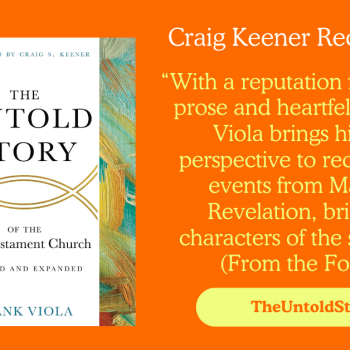Many people today are worn out on religion. We are up to our ears in it. John Adams, one of our founding fathers, early in his career considered going into the ministry. He changed his mind however when he observed the local church services and the "fierceness of disagreement so inherent in the religion of the time."He found a great conflict between the complex demands of the church and the simplicity of the Gospel.
What would Adams think if he took a tour of today's religious world? We hear of one religion battling another in the name of their "god." We read of a radical group who believes they will attain a high entrance into heaven by an act of terrorism against "pagans." We watch some clergy members wear robes and carry out rituals one day and face indictments the next. We turn on talk shows to hear one religious leader slam another religion. Our increasingly pluralistic society has also become increasingly religious.
I remember some of my earliest brushes with religion or, should I say, religiosity. My eyes scrolled down the church bulletin for the fifth time in five minutes. Every agenda item on the scheduled liturgy was just something else I would have to endure. My mind worked hard to calculate and estimate how much time each of these "perfunctories" would demand.
Invocation—two minutes. Psalter—five minutes. Hymn #124—three to five minutes. Hymn #291—another three to five minutes. Sermon—twenty-five minutes, if I was lucky. And on and on it went until the mental calculator registered fifty-five minutes. Fifty-five minutes to go. Fifty-five minutes of nothing to do but sit here. Fifty-five minutes until I could be released from this holding position. Fifty-five minutes until my mind could run free again. Fifty-five minutes until I could do what I really wanted to do.
Mine was a test of endurance. The pew was hard. The clock, slow. The mind was wandering. The scene, all too familiar.
It was ten minutes after eleven on yet another Sunday morning. I was right where I had been told since my earliest years I was supposed to be at that time of the week. And, for the life of me, I could not figure out—why?
Ironically the one "well" in my life that was most often coming up dry was my religion. The other places of refreshment I was accustomed to frequenting all seemed to quite faithfully quench my thirst, at least for the moment. When friendship was lacking, my neighborhood buddies were usually around. When things started to get dull, our television or the local movie theatre usually had something to busy my mind. When life lacked a competitive edge, there was usually a pick-up football or baseball game to be enjoined a house or two down the street. But when purpose and meaning began to delude me, my religion seemed to serve up the same old stuff—as dry and bland as the processed wafers on the communion table. A predictable environment filled with monotone voices and shallow platitudes.
To me, my religion was just a place to go, but where was the purpose? What was the reason? It had served me lots of words over the years, but left me wondering and wandering still. In a world full of life and color and variety, it always felt so stayed, bland, and tasteless; black and white in a world full of color. It was, or felt to be, the least alive place in my world. It was a place, for some odd reason, that I felt good about having gone to, but rarely did I ever feel good about being there. I didn't want to admit it, but I was worn out on religion . . . and I was only fifteen.
The fact is, I must admit . . . Religion leaves me wanting. Truth be known, I don't even like the word anymore. And my frustration is nothing new; many people feel it. As a matter of fact, throughout the centuries many others have been worn out on religion. In John Adams' words (1756):
Where do we find precepts in the Gospel, requiring . . . Convocations, Councils, Decrees, Creeds, Confession, Oaths, Subscriptions and whole Cartloads of other trumpery, that we find religion encumbered with in these days?
The world that Jesus entered and walked in was one that, like ours, was full of religious "trumpery," tensions and regiments, so much so that he chose not to bring to the world just another "religion." The Scripture does not read, "For God so loved the world that he created another religion . . ."
Had Jesus only brought a new religion to the world, his voice would never have been as distinct a trumpet as it was. Clearly he brought something other than religion. He brought something that, ironically and in unprecedented ways, at once powerfully attracted the irreligious and offended the religious. In its pure form, it held such power that it virtually overtook the Roman world within three short centuries.





